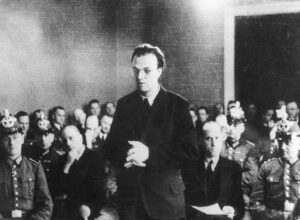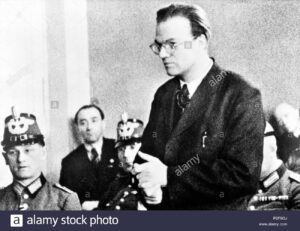08 May Alfred Delp: The Pentecost Meditation

Alfred Delp in Berlin’s “People’s Court”, January 8-9, 1945
One day in mid-January, 1945, the Jesuit Alfred Delp wrote to his secretary from his cell in Berlin’s Tegel Prison: “I’ve begun writing a few thoughts on the Pentecost prayer for you.”
The letter was later dated “after 11 January”. That date, the 11th of January, was significant: a demarcation line. On that afternoon, after his two-day trial for high treason, Delp had stood before the judge of the Third Reich’s “People’s Court” and received his verdict: guilty. The sentence: death by hanging.
Delp had been arrested in the sweep of resisters that followed the failed attempt on Hitler’s life the previous July.
Born in Mannheim to a Catholic mother and a Protestant father, Delp had been raised and confirmed a Lutheran before being received into the Catholic Church at the age of 14. He joined the Jesuits in 1926, and after his ordination in 1937 had worked as a journalist for Stimmen der Zeit. When that Jesuit magazine was suppressed in 1941, he was appointed rector of St Georg Church in Munich. He had been part of a resistance group, later called the “Kreisau Circle” by the trial judge, named after the estate of the group’s aristocratic leader, Helmuth von Moltke. The group had been planning a reconstructed Germany after what they knew to be the Third Reich’s inevitable defeat. Delp’s provincial superior, Augustin Rösch, had been brought into the group as a channel to the German Catholic hierarchy, and he had invited Delp, who was an expert on the Church’s social teaching, and another Jesuit, Lothar König, to join them.
The other two Jesuits had gone into hiding after the assassination attempt, but Delp, looking forward to making his final vows on August 15, chose to remain at his parish in Munich. By that date, he was already undergoing “enhanced interrogation” in a Gestapo prison in Berlin, having been met outside his church by two officials and a waiting car after he emerged from morning Mass. Of the interrogation and torture he endured that night, he writes, “….how I prayed to God that he might send death to deliver me because of the helplessness and pain I felt I could no longer endure, and the violence and hatred to which I was no longer equal. How I wrestled with God that night and finally in my great need crept to him, weeping. Not until morning did a great peace come to me, a blissful awareness of light, strength and warmth….”
After a few weeks he was sent to Tegel Prison to await his trial. Others from the Kreisau Circle were there too, and they set up a system of knocking on cell walls to announce to each other their times of prayer. Two women friends devised a method of smuggling writing materials to Delp through the laundry. His hands were almost entirely in shackles. The weeks became months as within his tiny cell Delp worked on his defence and faced his own fragility. He wept and prayed and came close to despair, and then at times felt flooded with grace. “One thing is clear and tangible to me in a way it seldom has been:” he writes in a 17 November letter: “….the world is full of God. From every pore, God rushes out to us, as it were.” And a few days later, noting that God is stripping and purifying him in a way he neither expected nor wanted, he writes that God “knocked all my assets out of my hand and let my self-assurance fall to pieces….” Every day, he was confronted by fear.
A spiritual turning point came when he received a surprise visit from a Jesuit friend called Franz von Tattenbach on the morning of 8 December. This young Jesuit had been commissioned by his provincial superior to receive Delp’s final vows in the Society of Jesus. In the small meeting room, under the careful watch of a prison guard, Delp pronounced aloud the Latin vow formula, his voice breaking into sobs.
In a letter to Tattenbach the next day, he apologized for having been “soft”, but his final vows, made amid extreme circumstances, released new energies in him. “I have handed over my life completely,” he said in the same letter. “The external chains mean nothing any more, now that God has found me worthy of the vincula amoris [chains of love].” A few days earlier, on the First Sunday of Advent, he had already begun writing a reflection on the meaning of the first season of the Church year. Now began a continuation of that reflection, and as the weeks moved on it was followed by meditations on Christmas and Epiphany.

Delp with his immediate family on the day of his ordination to the priesthood, June,1937
After the January trial and the condemnation, he returned to Tegel Prison and the usual day-to-day routine of shackles and waiting; fear mingled with hope. He allowed himself to wonder if he might receive a reprieve, although writing of the trial to friends, he said, “the atmosphere is so full of hate and hostility that there’s no doubt about what’s going to happen.” Still, for his mother’s sake, he asked those working on his behalf to send in an appeal.
Again, new energies were unleashed. He began to write meditations on the Litany of the Sacred Heart and the Lord’s Prayer. Then he turned his attention to the Sequence prayer of the Mass for Pentecost Sunday, “Come, Holy Spirit”, a favourite prayer that he sometimes gave as a penance in Confession. His reflection on the prayer—in which he describes the third person of the Trinity as “the breath of creation”– is permeated by the longing for inner freedom and the cry for help in surrendering to go wherever God was leading him.

Delp sailing on Starnberger See in happier days.
Surrender did not come easily. In his previous life, he had often chafed under Jesuit obedience. A fellow Jesuit who had studied with him described him as an “enfant terrible”: an independent spirit. Likewise, a teenager who attended his Nazi-forbidden clandestine talks to youth remembered a larger-than-life priest, overflowing with joie de vivre. He had an exceptional mind, and a brilliant life lay ahead of him. “These last few months have blown a great deal of my work sky high; according to the verdict perhaps my very existence on this earth must come to an end,” he writes in the Pentecost meditation. “Yet there have been miracles. God has taken my case entirely into his hands. I have learnt how to send up my cry and to wait for the message of encouragement from the eternal hills.”
Throughout his imprisonment, Delp used various metaphors to describe his situation: he was Peter, afraid of drowning in the waves; he was a tightrope walker, barely keeping his balance; he was a mountain climber, breathing rarified air. Increasingly, as the weeks passed, he was the seed falling into the ground. “The earth is being ploughed and new seed sown,” he writes later on in the meditation.
In his reflection on the Sequence’s second-last stanza (“Grant to thy faithful whose only hope is in you…”), Delp writes: “Despite our indwelling Spirit we often feel tired and frightened and disheartened because we do not trust the Spirit of God sufficiently for him to be able to make something of us. We believe more in our own unworthiness than in the creative impulse of God.”
On 23 January Delp’s Kreisau comrades were taken from the Tegel Prison and executed. It is not known why Delp was left. Rösch, his provincial superior, had been captured earlier in January and was undergoing the same rough interrogations that Delp had endured and was taunted with the prospect of the two of them together in a “Jesuit trial”. (For whatever reason, this did not happen, and Rösch would be freed at the end of the war.)
Delp’s cell door was opened on 31 January, and he was led to a car that drove him to Plötzensee Prison, the place of execution. There he signed over his clothes with a shaking hand and donned prison garb. He was allowed to keep his rosary. When the prison chaplain came to visit him, he asked for a copy of The Imitation of Christ, by Thomas à Kempis.
On 2 February, he was led out of his cell and outside to the chamber where five meat hooks hung from a rafter. He was led under one of them. After his death, the chaplain found in Delp’s cell his rosary, the copy of The Imitation of Christ, and Delp’s broken eyeglasses.
The Pentecost meditation ends: “It all hinges on trust, on whether we are willing to receive God’s creative blessing and let it fulfil our lives….Blessed are those who hunger and thirst.”
—published in The Tablet, 28 May 2020
© 2021 Mary Frances Coady. All rights reserved.


